From criminality during Perestroika and privatizations to the problem with Russia’s “imperialist war” designation, Natylie Baldwin discusses a wide range of subjects with the author of The Catastrophe of Ukrainian Capitalism.
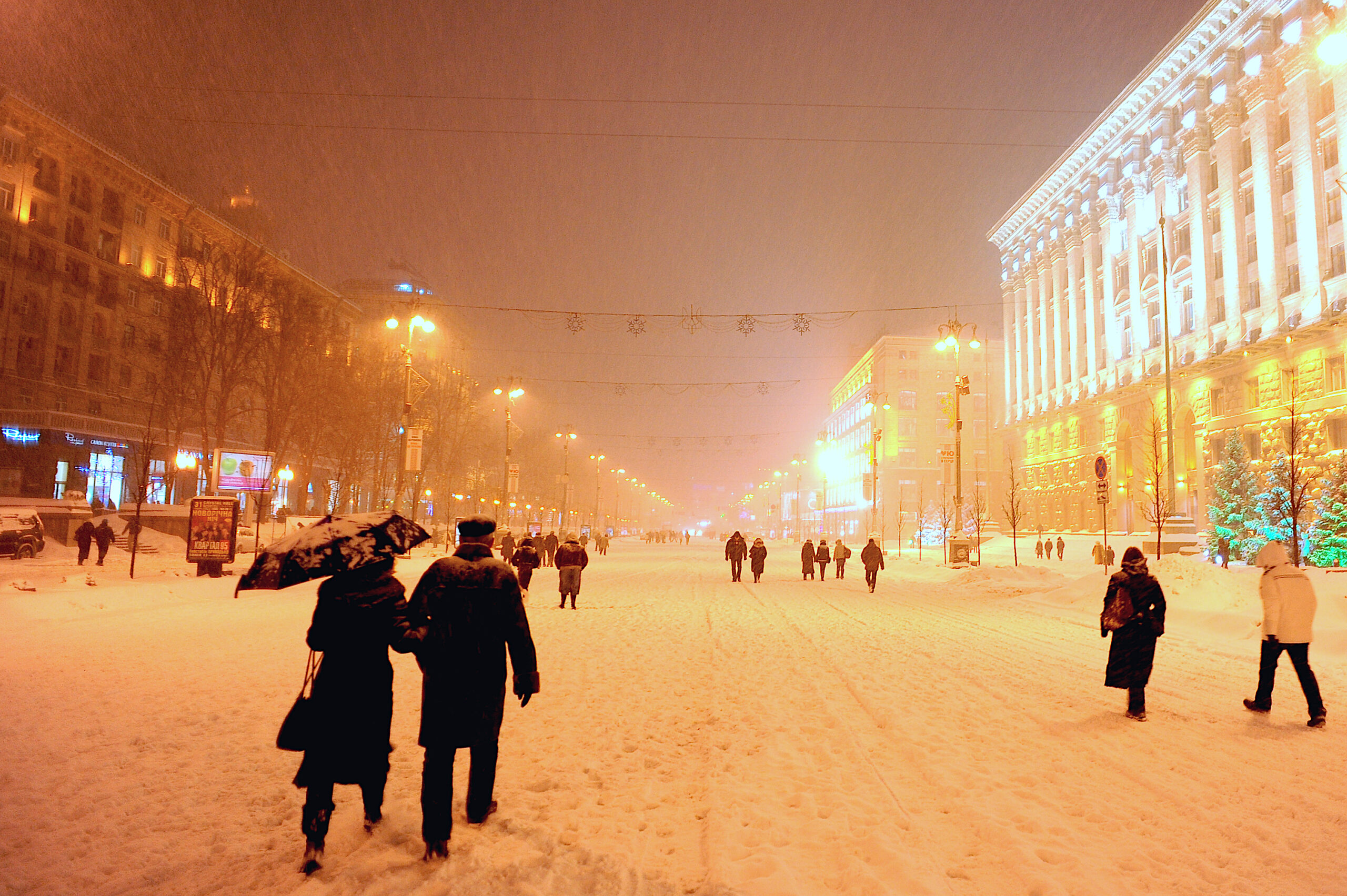
Khreshchatyk Street in winter, Kiev, 2009. (Mstyslav Chernov, CC BY-SA 3.0, Wikimedia Commons)
By Natylie Baldwin
Covert Action
Renfrey Clarke is an Australian journalist. Throughout the 1990s he reported from Moscow for Green Left Weekly, of Sydney. He is the author of The Catastrophe of Ukrainian Capitalism: How Privatisation Dispossessed & Impoverished the Ukrainian People published by Resistance Books in 2022. Here is my recent interview with him.
 Natylie Baldwin: You point out in the beginning of your book that Ukraine’s economy had significantly declined by 2018 from its position at the end of the Soviet era in 1990. Can you explain what Ukraine’s prospects looked like in 1990? And what did they look like just prior to Russia’s invasion?
Natylie Baldwin: You point out in the beginning of your book that Ukraine’s economy had significantly declined by 2018 from its position at the end of the Soviet era in 1990. Can you explain what Ukraine’s prospects looked like in 1990? And what did they look like just prior to Russia’s invasion?
Renfrey Clarke: In researching this book I found a 1992 Deutsche Bank study arguing that of all the countries into which the U.S.S.R. had just been divided, it was Ukraine that had the best prospects for success. To most Western observers at the time, that would have seemed indisputable.
Ukraine had been one of the most industrially developed parts of the Soviet Union. It was among the key centres of Soviet metallurgy, of the space industry and of aircraft production. It had some of the world’s richest farmland and its population was well-educated even by Western European standards.
Add in privatisation and the free market, the assumption went, and within a few years Ukraine would be an economic powerhouse, its population enjoying first-world levels of prosperity.
 Fast-forward to 2021, the last year before Russia’s “Special Military Operation,” and the picture in Ukraine was fundamentally different. The country had been drastically de-developed, with large, advanced industries (aerospace, car manufacturing, shipbuilding) essentially shut down.
Fast-forward to 2021, the last year before Russia’s “Special Military Operation,” and the picture in Ukraine was fundamentally different. The country had been drastically de-developed, with large, advanced industries (aerospace, car manufacturing, shipbuilding) essentially shut down.
World Bank figures show that in constant dollars, Ukraine’s 2021 Gross Domestic Product was down from the 1990 level by 38 percent. If we use the most charitable measure, per capita GDP at Purchasing Price Parity, the decline was still 21 percent. That last figure compares with a corresponding increase for the world as a whole of 75 percent.
To make some specific international comparisons, in 2021 the per capita GDP of Ukraine was roughly equal to the figures for Paraguay, Guatemala and Indonesia.
What went wrong? Western analysts have tended to focus on the effects of holdovers from the Soviet era, and in more recent times, on the impacts of Russian policies and actions. My book takes these factors up, but it’s obvious to me that much deeper issues are involved.
In my view, the ultimate reasons for Ukraine’s catastrophe lie in the capitalist system itself, and especially, in the economic roles and functions that the “centre” of the developed capitalist world imposes on the system’s less-developed periphery.
Quite simply, for Ukraine to take the “capitalist road” was the wrong choice.
Baldwin: It seems as though Ukraine went through a process similar to that in Russia in the 1990s, when a group of oligarchs emerged to control much of the country’s wealth and assets. Can you describe how that process occurred?
Clarke: As a social layer, the oligarchy in both Ukraine and Russia has its origins in the Soviet society of the later perestroika period, from about 1988. In my view, the oligarchy arose from the fusion of three more or less distinct currents that by the final perestroika years had all managed to accumulate significant private capital hoards. These currents were senior executives of large state firms; well-placed state figures, including politicians, bureaucrats, judges and prosecutors; and lastly, the criminal underworld, the mafia.
A 1988 Law on Cooperatives allowed individuals to form and run small private firms. Many structures of this kind, only nominally cooperatives, were promptly set up by top executives of large state enterprises, who used them to stow funds that had been bled off illicitly from enterprise finances. By the time Ukraine became independent in 1991, many senior figures in state firms were substantial private capitalists as well.
The new owners of capital needed politicians to make laws in their favour and bureaucrats to make administrative decisions that were to their advantage. The capitalists also needed judges to rule in their favour when there were disputes and prosecutors to turn a blind eye when, as happened routinely, the entrepreneurs functioned outside the law. To perform all these services, the politicians and officials charged bribes, which allowed them to amass their own capital and, in many cases, to found their own businesses.
Finally, there were the criminal networks that had always operated within Soviet society, but that now found their prospects multiplied. In the last years of the U.S.S.R., the rule of law became weak or non-existent. This created huge opportunities not just for theft and fraud, but also for criminal stand-over men. If you were a business operator and needed a contract enforced, the way you did it was by hiring a group of “young men with thick necks.”
To stay in business, private firms needed their “roof,” the protection racketeers who would defend them against rival shake-down artists — for an outsize share of the enterprise profits. At times the “roof” would be provided by the police themselves, for an appropriate payment.
This criminal activity produced nothing, and stifled productive investment. But it was enormously lucrative, and gave a start to more than a few post-Soviet business empires. The steel magnate Rinat Akhmetov, for many years Ukraine’s richest oligarch, was a miner’s son who began his career as a lieutenant to a Donetsk crime boss.
“This criminal activity produced nothing, and stifled productive investment. But it … gave a start to more than a few post-Soviet business empires.”
Within a few years from the late 1980s, the various streams of corrupt and criminal activity began merging into oligarchic clans centred on particular cities and economic sectors. When state enterprises began to be privatised in the 1990s, it was these clans that generally wound up with the assets.
I should say something about the business culture that arose from the last Soviet years, and that in Ukraine today remains sharply different from anything in the West.
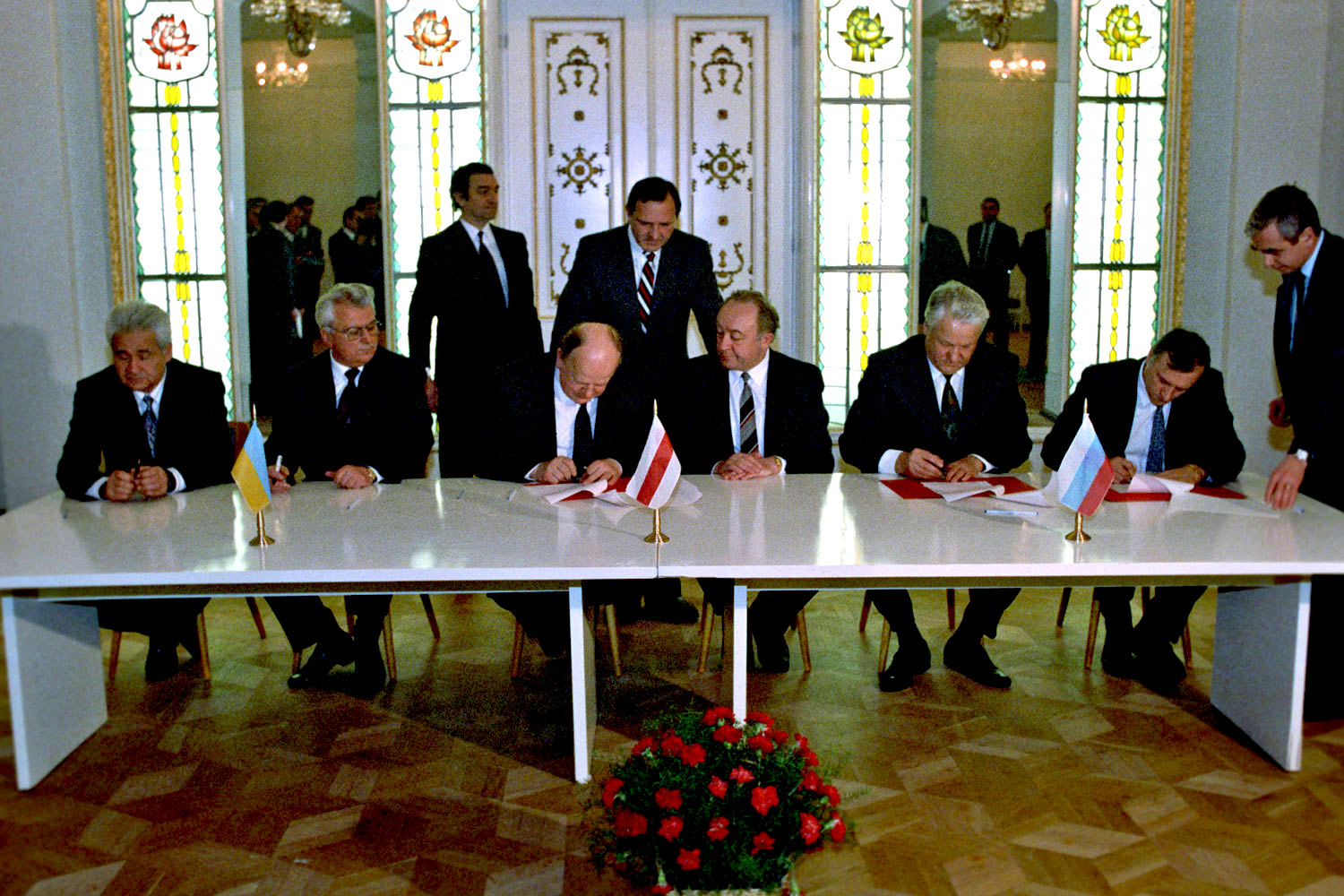
Signing agreement to establish the Commonwealth of Independent States on Dec. 8, 1991. Ukrainian President Leonid Kravchuk is seated, second from left. (RIA Novosti Archive, U. Ivanov, CC-BY-SA 3.0, Wikimedia Commons)
Few of the new business chiefs knew much about how capitalism was supposed to work, and the lessons in the business-school texts were mostly useless in any case. The way you got rich was by paying bribes to tap into state revenues, or by cornering and liquidating value that had been created in the Soviet past. Asset ownership was exceedingly insecure — you never knew when you’d turn up at your office to find it full of the armed security guards of a business rival, who’d bribed a judge to permit a takeover. In these circumstances, productive investment was irrational behaviour.
Baldwin: I’ve heard that one source of opposition to political decentralization — which would appear to have been a possible solution to Ukraine’s divisions before the war — is that centralisation benefits the oligarchs. Do you think that’s true?
Clarke: There’s no simple answer here. Politically and administratively, Ukraine since independence has been a relatively centralised state. Provincial governors aren’t elected but are appointed from Kyiv. This has reflected fears in Kyiv of separatist trends arising in the regions. Here, obviously, we should have in mind the Donbass.
Despite being centralised, the Ukrainian state machine is quite weak. A great deal of real power lies with the regionally-based oligarchic clans. Unlike the situation in Russia and Belarus, no single individual or oligarchic grouping has been able to achieve unrivalled dominance and curtail the power of the chronically warring business magnates. Ukraine has never had its [Russian President Vladimir] Putin or [Belarusian President Alexander] Lukashenko.
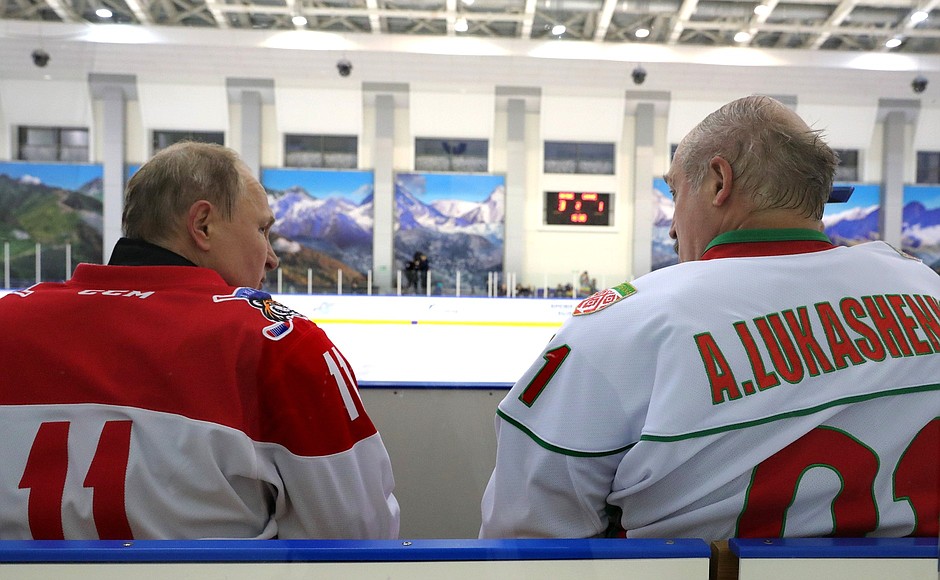
Vladimir Putin, left, and Alexander Lukashenko, during a friendly ice hockey match, Feb. 7, 2020. (President of Russia)
The system in Ukraine can thus be described as a highly fluid oligarchic pluralism, with control over the government in Kyiv shifting periodically between unstable groupings of individuals and clans. On the whole, the oligarchs over the decades seem to have been content with this, since it has prevented the rise of a central authority able to discipline them and cut into their prerogatives.
Baldwin: You discuss how the enforced economic separation between Ukraine and Russia has been detrimental to the Ukrainian economy. Can you explain why?
Clarke: Under Soviet central planning, Russia and Ukraine formed a single economic expanse, and enterprises were often tightly integrated with customers and suppliers in the other republic. Indeed, Soviet planning had often provided for only one supplier of a particular good in a whole swathe of the U.S.S.R., meaning that cross-border trade was essential if whole chains of production were not to break down.
Understandably, Russia remained by far Ukraine’s largest trading partner throughout the first decades of Ukrainian independence. Despite problems such as erratic currency exchange rates, this trade had compelling advantages. Customs barriers were absent, and technical standards, inherited from the U.S.S.R., were mostly identical. Ways of doing business were familiar, and negotiations could be conducted conveniently in Russian.
Perhaps most critically important was another factor: the two countries were on broadly similar levels of technological development. Their labour productivity did not differ by much. Neither side was in danger of seeing whole industrial sectors wiped out by more sophisticated competitors based in the other country.
Nevertheless, one of the truisms of liberal discourse, both in Ukraine and in Western commentaries, was that the close economic ties with Russia were holding Ukraine back. There was said to be an urgent need for Ukraine to turn its back on Russia, identified with the Soviet past, and to open itself up to the West. Ukraine’s commerce with Russia, in this scenario, needed to be replaced by “deep and comprehensive free trade” with the European Union.
“One of the truisms of liberal discourse, both in Ukraine and in Western commentaries, was that the close economic ties with Russia were holding Ukraine back.”
This controversy had wide-ranging ideological, political and even military ramifications. But to be brief, by 2014 opposition within Ukraine had been overcome and an Association Agreement with the EU had been signed. By 2016 trade between Ukraine and Russia had shrunk dramatically, to the point where it was much less than commerce with the EU.
The shift to integration with the West, however, did not bring Ukraine the promised surge of economic growth. After a severe slump in the aftermath of the Maidan events of 2014, Ukrainian GDP saw only a weak recovery between 2016 and 2021. Meanwhile, the country’s trade balance with the EU remained strongly negative. Integration with the West was doing far more for the West than for Ukraine.
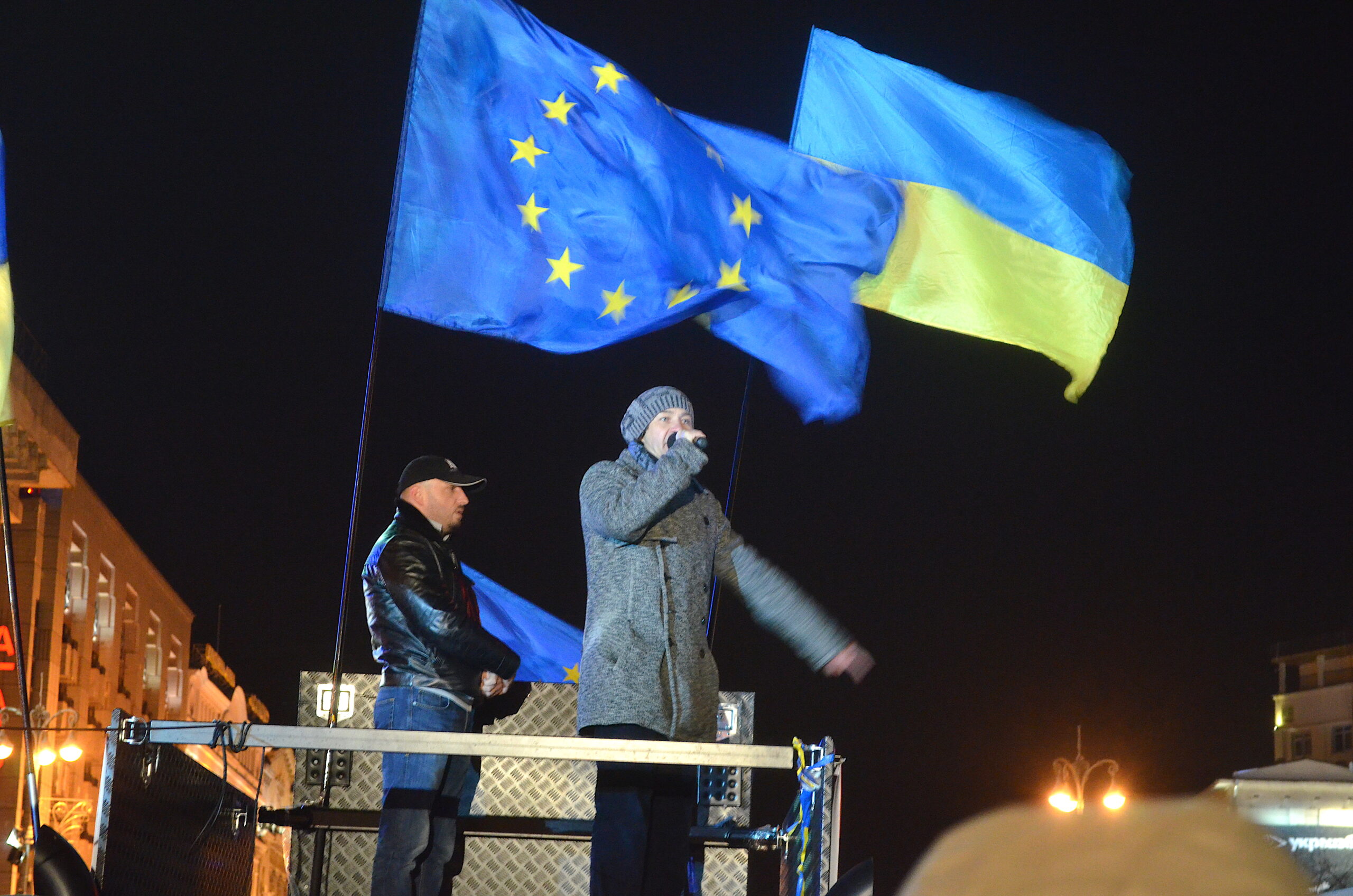
Pro-EU protesters in Kiev, December 2013. (Ilya, CC BY-SA 3.0, Wikimedia Commons)
Baldwin: You made an interesting comment about pro-Western liberals in both Russia and Ukraine (including Maidan protestors/supporters): “Like their counterparts in Russia, the members of these ‘Westernising’ middle layers tend to be naïve about the realities of Western society, and about what incorporation into developed-world economic structures means in practice for countries whose economies are far poorer and more primitive.” (p. 9). Can you describe the actual effect of the policies that resulted from Maidan and the signing of the EU Association Agreement? It sounds like a case of “be careful what you wish for.”
Clarke: If you want to break the hearts of Ukraine’s liberal intelligentsia, just remind them that economic growth in the European Union is stagnant, and European societies crisis-ridden.
Ukraine now has an economic integration agreement with the EU, allowing for extensive areas of free trade. But Ukraine isn’t being integrated into European capitalism as part of the high-productivity, high-wage “core” of the system. After all, why would EU countries want to give themselves an extra competitor?
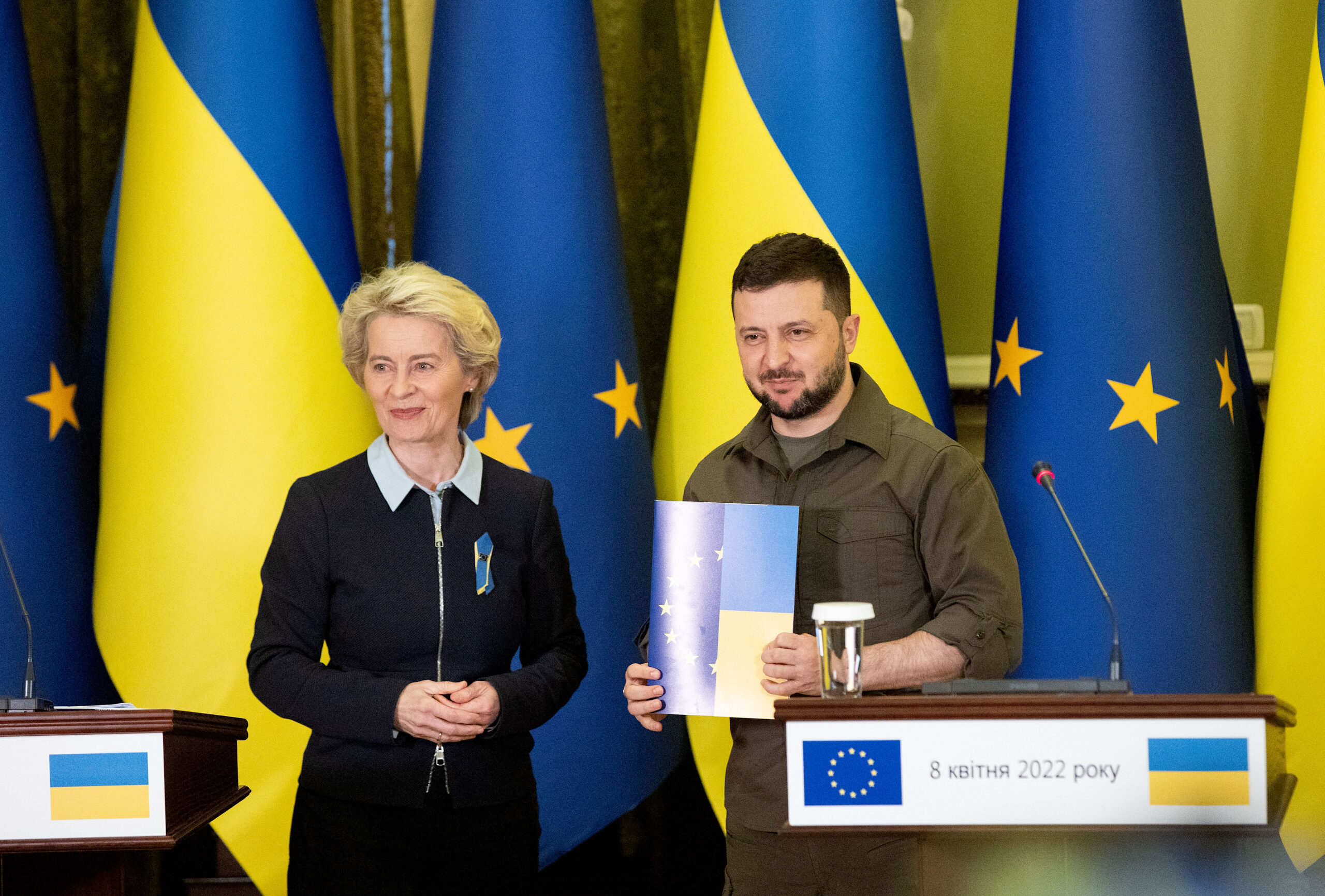
Presentation of the EU membership questionnaire on April 8, 2022, by the European Commission President Ursula von der Leyen and Ukraine’s President Volodymyr Zelensky. (President.gov.ua, CC BY 4.0, Wikimedia Commons)
Instead, the role Ukraine has been assigned is that of a market for advanced Western manufactures, and of a supplier to the EU of relatively low-tech generic goods such as steel billets and basic chemicals. These are low-profit commodities that Western producers are tending to move out of in any case, especially since the industries concerned can be highly polluting.
In Soviet times, as I’ve explained, Ukraine was a centre of sophisticated, at times world-class manufacturing. But in the mayhem surrounding privatisation, investment levels collapsed, innovation virtually ceased, and products became uncompetitive in developed-world markets. In the dreams of liberal theorists, foreign capitalists had been going to troop over the border, buy up ruined industrial enterprises, re-equip them and on the basis of low wages, make attractive profits from exports to the West. But Ukraine had a criminalised economy run by oligarchs. Rather than swim with sharks, potential foreign investors opted overwhelmingly to stay away.
The dropping of EU import tariffs was predicted to turn this situation around, by making the attractions of investment in Ukraine irresistible for Western capital. Meanwhile, the foreign investors were supposed to out-compete the oligarchs, and force reforms on the corrupt, business-unfriendly state machine.
But none of this has really happened. Foreign investment has remained tiny. At the same time, free trade with the EU has meant that Western manufacturers, with higher productivity and a more attractive range of offerings, have been able to take over large parts of the Ukrainian domestic market and drive local producers out of business.
As an example, I could cite the Ukrainian car industry. In 2008 the country produced more than 400,000 motor vehicles. The last important year of production was 2014. Then in 2018 a reduction of tariffs brought a huge increase in imports of used cars from the EU, and output of passenger cars in Ukraine effectively ceased.
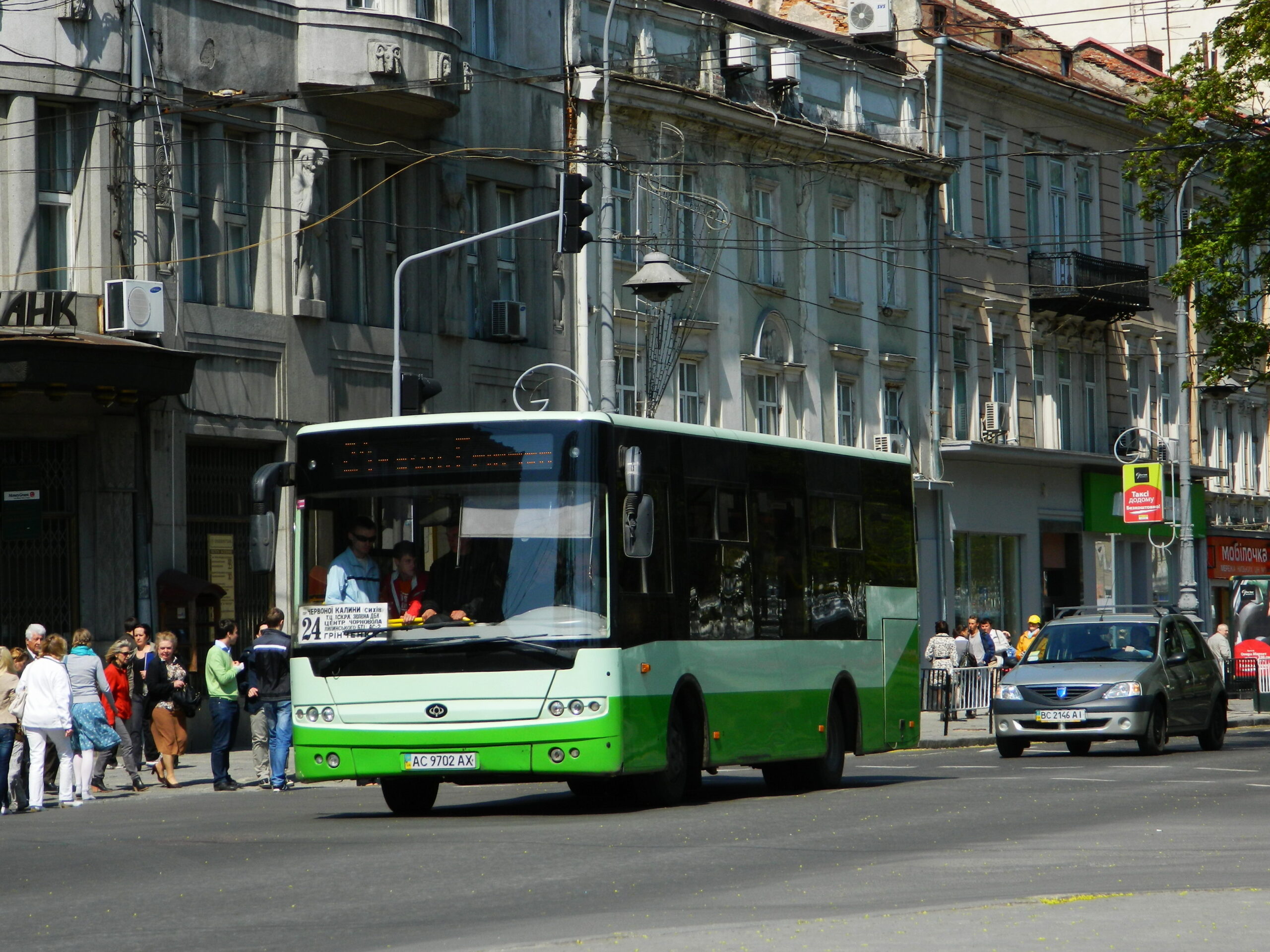
Ukrainian-made Bogdan city bus in Lviv, Ukraine, 2010. (Anatoliy-024, CC BY-SA 3.0, Wikimedia Commons)
Baldwin: On a related note, I can’t help but observe that Ukraine seems to have fallen victim to neoliberal corporatist policies that benefit more powerful outside powers — the kind of policies that used to be criticised and opposed by the anti-globalisation movement of the 90s. The left used to recognise these economic policies, when they were imposed on weaker countries, as a form of neocolonialism. Now it seems like the left — at least in the U.S. — has been reduced to a frightened waif obsessing over a caricaturised form of identity politics and regurgitating the latest war propaganda. What, in your opinion, has happened to the left?
Clarke: In my view, most sections of the Western left have failed to come up with an adequate response to the war in Ukraine. Fundamentally, I see the problem as rooted in an adaptation to liberal attitudes and habits of thought, and in a failure to educate a whole generation of activists in the distinctive traditions, including the intellectual traditions, of the class struggle movement.
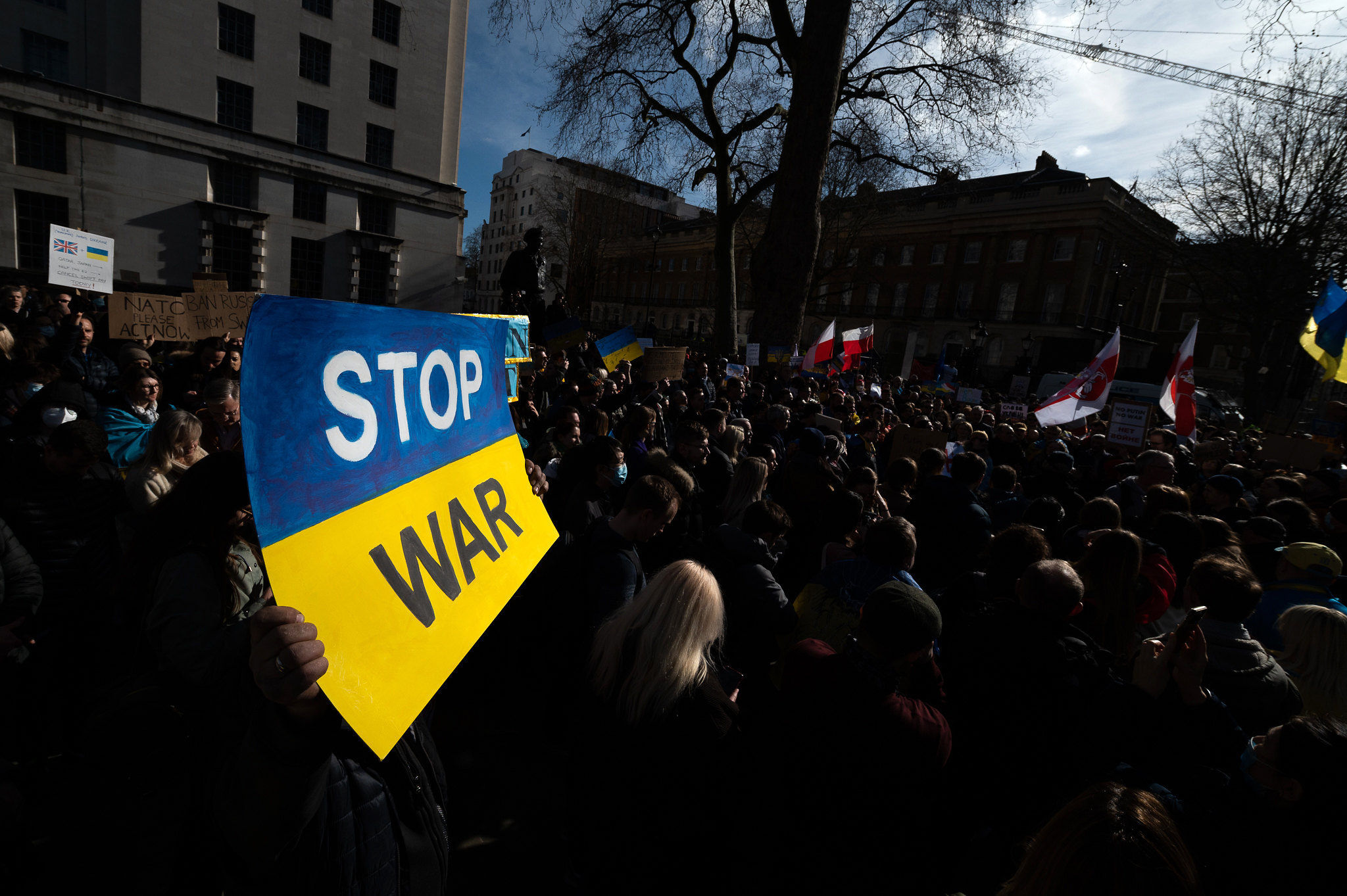
Stand With Ukraine, protest in London, Feb. 26. (Catholic Church England and Wales, Flickr, CC BY-NC-ND 2.0)
Today, numerous members of the left simply lack the methodological equipment to understand the Ukraine issue — which is, to be fair, fiendishly complex. Here I’d make two points. First, it’s critically important for the left to reach a clear understanding of whether present-day Russia is, or is not, an imperialist power. Second, in addressing this question, there’s no way the left should allow itself to rest on the thinking of The Guardian and The Washington Post. Our methodology has to come from the tradition of left thinkers such as [Rosa] Luxemburg, [Vladimir] Lenin, [Nikolai] Bukharin and [György] Lukács.
The liberal empiricism of The Guardian will tell you that Russia is an imperialist power, as “proved” by the fact that Russia has invaded and occupied the territory of another country. But even in recent decades, various countries that are manifestly poor and backward have done precisely this. Does this mean we should be talking about “Moroccan imperialism” or “Iraqi imperialism”? That’s absurd.
In the classic left analysis, modern imperialism is a quality of the most advanced and wealthy capitalism. Imperialist countries export capital on a massive scale, and drain the developing world of value through the mechanism of unequal exchange. Here Russia simply doesn’t fit the bill. With its relatively backward economy based on the export of raw commodities, Russia is a large-scale victim of unequal exchange.
“Imperialist countries export capital on a massive scale, and drain the developing world of value through the mechanism of unequal exchange. Here Russia simply doesn’t fit the bill.”
For the left, joining with imperialism in attacking one of imperialism’s victims should be unthinkable. But that’s what many leftists are now doing.
Since the early 1990s, NATO has expanded from central Germany right to Russia’s borders. Ukraine has been recruited as a de facto member of the Western camp, and has been equipped with a large, well-armed, NATO-trained army. Imperialist threats and pressures against Russia have multiplied.
Imperialism has to be resisted. But does this mean that the left should support Putin’s actions in Ukraine? Here we should reflect that a workers’ government in Russia would have countered imperialism in the first instance through a quite different strategy, centred on international working-class solidarity and revolutionary anti-war agitation.
Obviously, that’s a course Putin will never follow. But does Russia’s decision to resist imperialism through methods that aren’t ours mean we should denounce the very fact of Russian resistance?
Again, that’s unthinkable. We have to stand with Russia against the attacks on it by imperialism and by the Ukrainian ruling class. Of course, Putin’s politics aren’t ours, so our support for the Russian cause must be critical and nuanced. We’re under no obligation to support specific policies and actions of Russia’s capitalist elite.
That said, the left-liberal position, of seeking victory for imperialism and its allies in Ukraine, is deeply reactionary. Ultimately, it can only multiply suffering through emboldening the U.S. and NATO to launch assaults in other parts of the world.
“Our support for the Russian cause must be critical and nuanced. We’re under no obligation to support specific policies and actions of Russia’s capitalist elite.”
Baldwin: The war has also been a disaster for Ukraine economically. In October last year Andrea Peters wrote an in-depth article on how poverty had sky-rocketed in the country since the invasion. Some figures she cited included:
*10-fold increase in poverty
*35 percent unemployment rate
*50 percent reduction in salaries
*public debt of 85 percent of GDP
I’m sure it’s even worse now. It appears that the US/Europe are almost completely subsidising the Ukrainian government at this point. Can you talk about what you know of Ukraine’s current economic conditions?
Clarke: Ukraine’s economy has been shattered by the war. Government figures show GDP in the last quarter of 2022 down by 34 percent on the level a year earlier, and industrial production in September down by a similar amount. In March this year the cost of direct damage to buildings and infrastructure was put at $135 billion, and more than 7 percent of housing has reportedly been damaged or destroyed. Huge areas of cropland have not been sown, often because fields have been mined.
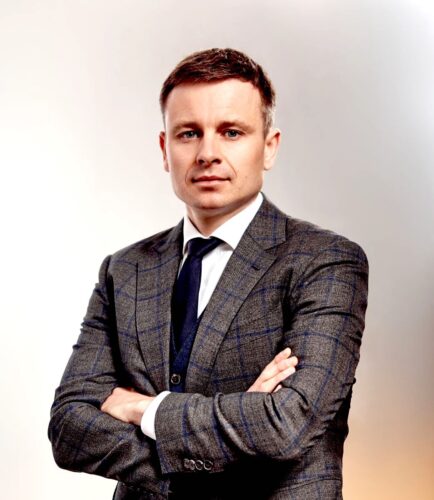
Serhiy Marchenko, Minister of Finance of Ukraine. (CC0, Wikimedia Commons)
The military draft has taken large numbers of skilled workers from their jobs. Other highly qualified people are among the Ukrainians, reportedly at least 5.5 million, who have left the country. An estimated 6.9 million people have been displaced within Ukraine, and this has also affected production.
According to Finance Minister Serhii Marchenko, just one-third of Ukraine’s budget revenue now comes from domestic sources. The difference is having to be made up by foreign loans and grants. This aid has been enough to keep annual inflation at a relatively manageable level of about 25 percent, but workers are rarely being compensated for price rises, and their living standards have collapsed.
In many cases, the Western aid is not in the form of grants but of loans. By my calculation, Ukraine’s external debt in January was about 95 percent of annual GDP. When and if peace returns, Ukraine will have to sacrifice its foreign exchange earnings over decades to pay back these borrowings.
Baldwin: Ukraine’s Prime Minister Denys Shmyhal has stated that for 2023 alone Ukraine will need $38 billion to cover the budget deficit and another $17 billion for “rapid reconstruction projects.” It would seem that it’s not sustainable (politically or economically) for the West to provide this kind of money for any length of time. What do you think?
Clarke: The figure I have for total planned U.S. military spending in 2023 is $886 billion, so the NATO countries can afford to maintain and rebuild Ukraine if they want to. The fact that they’re keeping the Ukrainian economy on a relative drip-feed — and worse, demanding that many of the outlays be paid back — is a conscious choice they’ve made.
There’s a lesson in this for developing-world elites that are tempted to act as proxies for imperialism, in the way that Ukraine’s post-2014 leaders have deliberately done. When the consequences get you in deep, don’t expect the imperialists to pick up the tab. Ultimately, they’re not on your side.
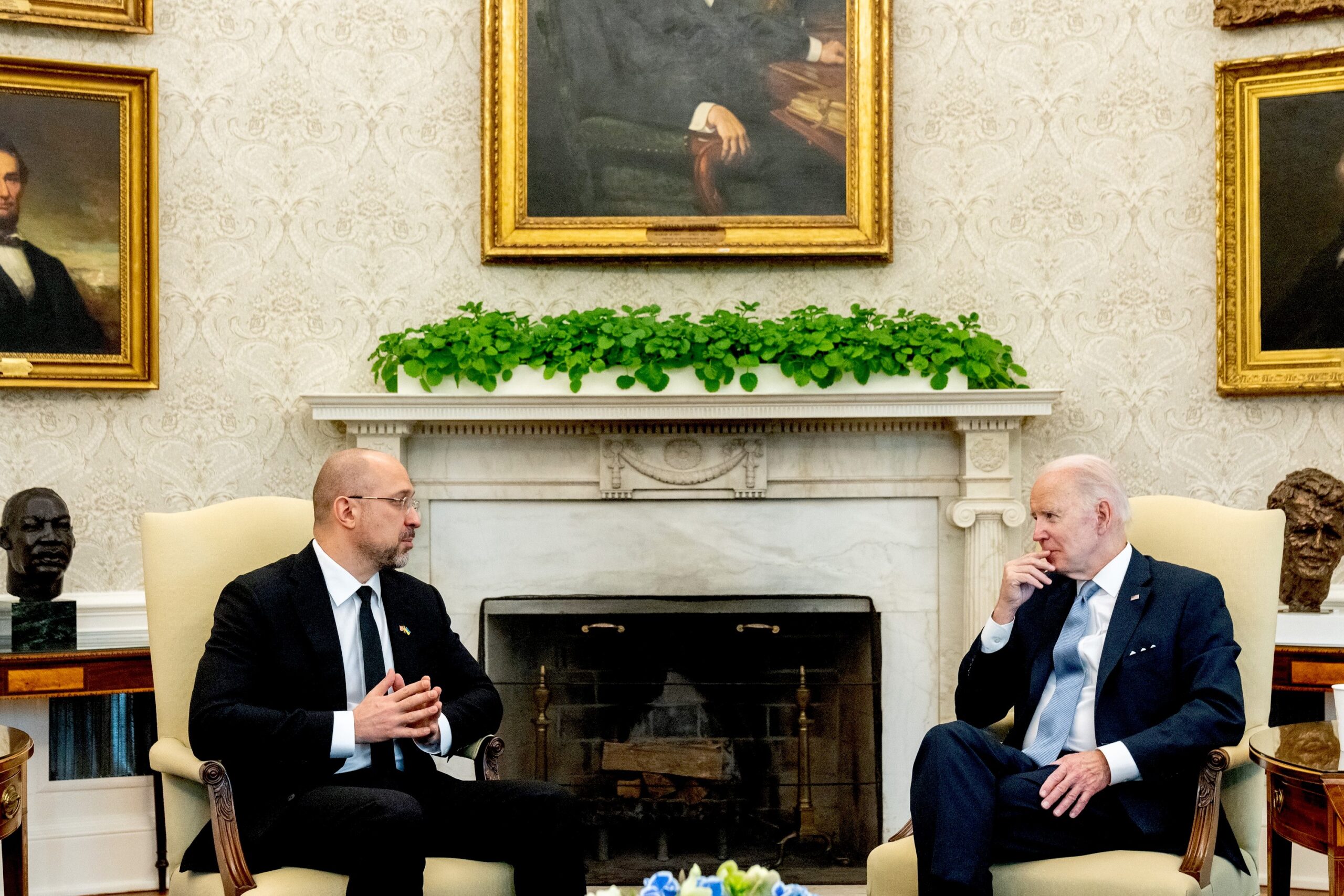
Ukraine’s Prime Minister Denys Shmyhal with U.S. President Joe Biden at the White House in April 2022. (White House/Public domain, Wikimedia Commons)
Baldwin: The Oakland Institute published a report in February of this year about a specific aspect of the western-influenced neoliberal policies on Ukraine — agricultural land. One of the first things [Ukraine’s President Volodymyr] Zelensky did after he took office in 2019 was to force through an unpopular land reform bill. Can you explain what this law was about and why it was so unpopular?
Clarke: By 2014 Ukraine’s farmland had almost all been privatised and distributed among millions of former collective farm workers. Until 2021. a moratorium remained on sales of agricultural land. This moratorium was overwhelmingly popular among the rural population, who distrusted the land-office bureaucracy and feared being swindled of their holdings. With only small acreages, and lacking capital to develop their operations, most landowners opted to lease their holdings and to work as employees of commercial farming enterprises.
The result has been described as a “re-feudalisation of Ukrainian agriculture.” Entrepreneurs with access to capital — often established oligarchs, but including U.S. and Saudi corporate interests — amassed control of vast lease holdings. With land rents cheap, and wages minimal, the new land barons had little reason to invest in raising productivity, which remained low despite the rich soil.
To this situation, already deeply retrograde, the International Monetary Fund and other institutional lenders brought the wisdom of neoliberal dogma. For many years, structural adjustment programs attached to IMF loans had insisted on the creation of a free market in agricultural land. Ukrainian governments, aware of the massive hostility to the move, had dragged their feet. It was Zelensky whose resistance finally broke. Since mid-2021 Ukrainian citizens have been able to purchase up to 100 hectares of agricultural land, with the figure to rise to 10,000 hectares from January 2024.
In theory, large numbers of small landowners will now sell their land, move to the cities, and take up life as urban workers, while rising land values will force commercial farmers to invest in raising their productivity. But these calculations are almost certainly utopian. Unemployment in the cities is already high, and housing tight. Small farmers are unlikely to risk mortgaging their land to improve their operations while profits remain slender, interest rates high, the banks predatory, and officials corrupt at every level.
The real logic of this “reform” is to strengthen the hold on agriculture of the oligarchs and international agribusiness.
Baldwin: The World Bank recently came out with a report stating that reconstruction after the war ends will cost at least $411 billion. When the fighting ends, what kind of policies do you think would give Ukraine the best chance at building a more stable and equitable economy in the long term?
Clarke: How is the fighting to end? At present, the Russian forces seem unlikely to be defeated, at least by the Ukrainians. Meanwhile, the closer a Russian victory, the greater the prospect of full-scale imperialist military intervention.
Suppose, though, that Zelensky were to sit down with Russian negotiators and hammer out a peace deal. Realistically, this would require a recognition by Ukraine that the Donbass and Crimea had been lost, along with Zaporizhzhia and Kherson provinces. Neofascists would have to be purged from the state apparatus, and their organisations outlawed. Ukraine would need to break its ties with NATO, and its armed forces would have to be cut to a level the country could afford.
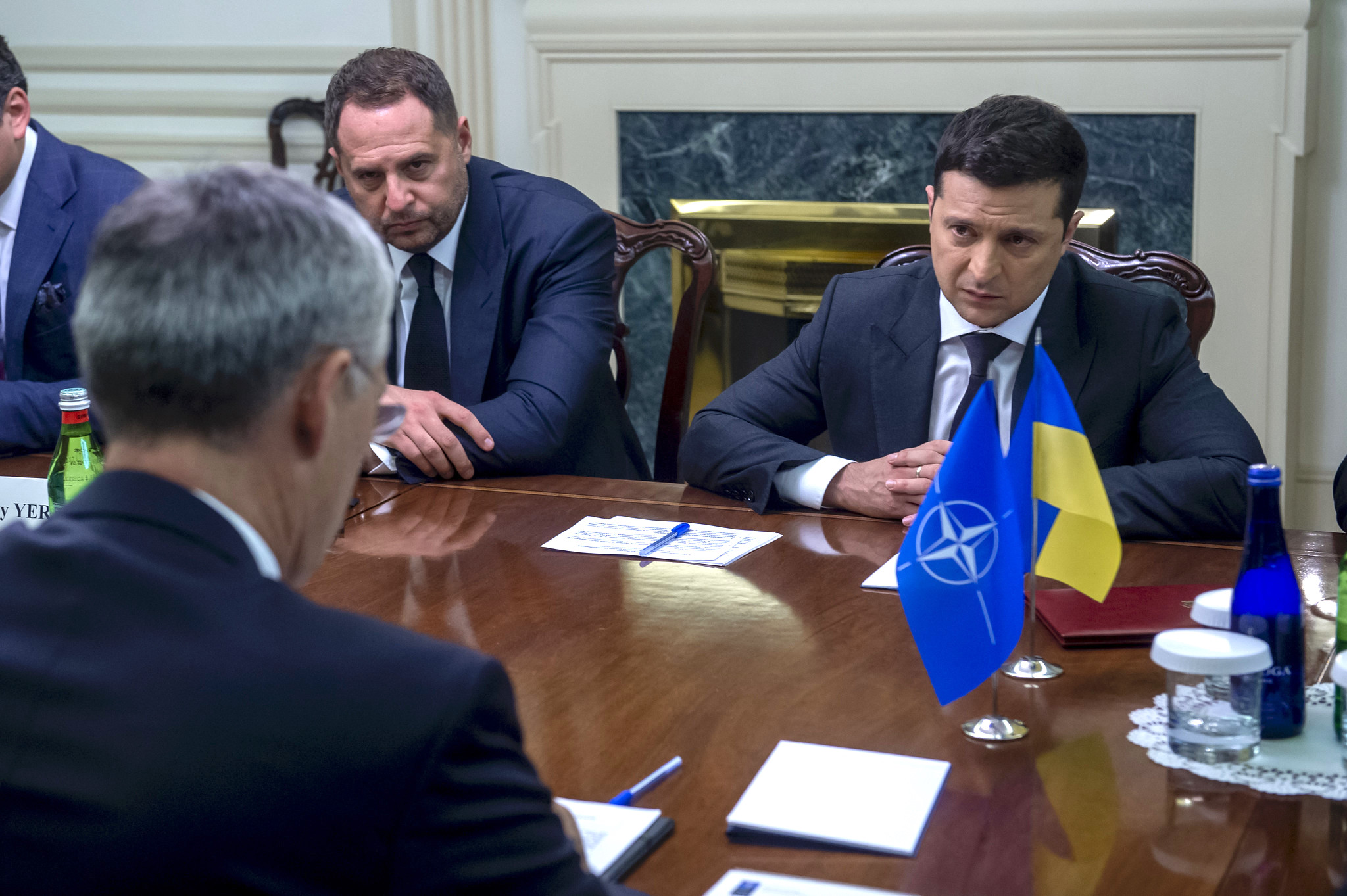
NATO Secretary General Jens Stoltenberg, back to camera, meeting with Ukraine’s President Volodymyr Zelensky in September 2021. (NATO)
If such a deal were reached, of course, Ukrainian ultra-nationalists would line up to assassinate Zelensky. If, that is, the C.I.A. didn’t get him first.
Presuming there can be an “after the war,” what might it look like? We must remember that Ukraine is now one of the poorer parts of the capitalist developing world. For countries in this general situation, there can be no genuinely “stable and equitable” economic future. Such a future is conceivable only outside capitalism, its crises, and its international system of plunder.
But let’s suppose that an independent Ukraine were somehow to emerge, that it was at peace, and that it was able to pursue some kind of rational economic course. In the first place, this course would involve a careful demarcation of the economy from the advanced West. Ideally, Ukraine would still have extensive trade with the EU. But this could not be at the cost of allowing unrestricted imports to stifle industries and sectors that had the potential to reach modern levels of sophistication and productivity.
Ukraine’s trading relations need to be based primarily on exchanges with states that share the country’s general level of technological development, so that commercial competition promises stimulus and not annihilation. This shift would involve the re-establishing of a dense network of economic relations with Russia. It would also feature an expansion of already extensive (in 2021) trade with states such as Turkey, Egypt, India and China.
“Ukraine’s trading relations need to be based primarily on exchanges with states that share the country’s general level of technological development, so that commercial competition promises stimulus and not annihilation.”
In politico-economic terms, Ukraine’s future doesn’t lie in “integration with the West” — a destructive fantasy — but in …. taking its place among the member states of organisations such as BRICS, the Belt and Road initiative, and the Shanghai Cooperation Organisation. For its financing needs, Ukraine needs to repudiate the IMF and look to bodies such as the Asian Infrastructure Investment Bank.
Those are necessary changes, and would greatly improve Ukraine’s prospects. But ultimately, a “stable and equitable” future needs much deeper transformations. It will require ousting the country’s crime lord oligarchs from control over the economy.
In some 30 years, and despite Western aid, Ukraine’s liberal reformers have made little progress on this front. The “middle layers” of the country’s society are simply not able or inclined to carry out such an overthrow. They have little social weight, and are not an independent force. Those of them who don’t work directly for the oligarchs are enmeshed, in many cases, in the corrupt state machine that the oligarchs control.
The only social force in Ukraine that has the massive numbers to end oligarchic power is the organised proletariat. Unlike the “middle layers,” the country’s workers have no stake in preserving oligarchism, and have the potential to act independently of it.
Baldwin: You reported from Moscow in the 1990s for the newspaper Green Left. How did that come about, and what stands out to you most about your time in Russia?
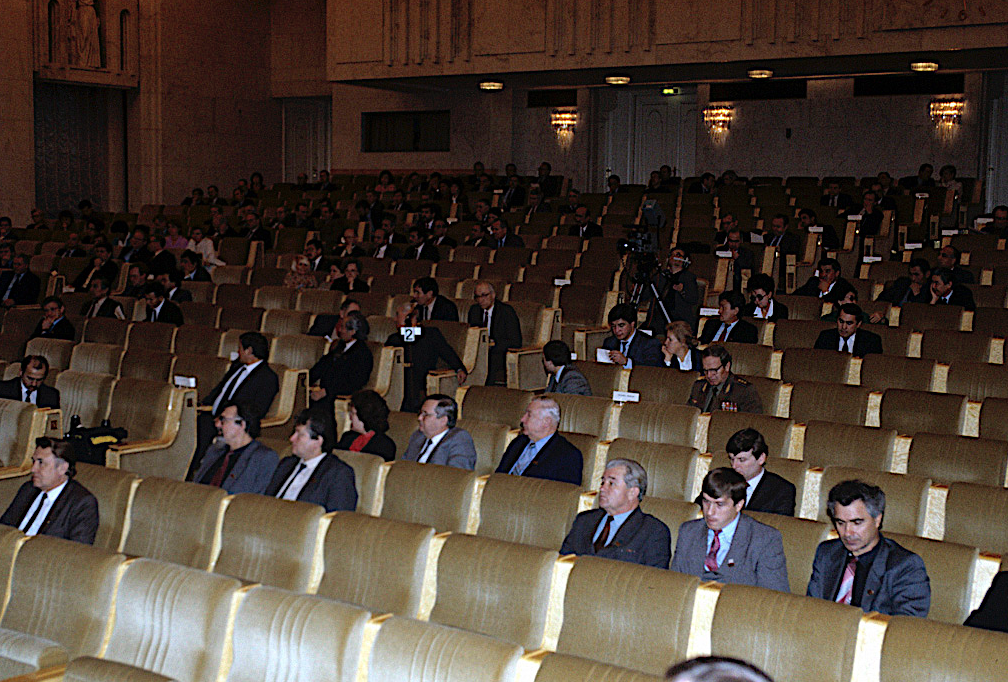
The upper chamber of the Supreme Soviet in its ultimate session, voting the U.S.S.R. out of existence, Dec. 24, 1991. (RIA Novosti Archive/Alexander Makarov / CC-BY-SA 3.0, Wikimedia Commons)
Clarke: As a Russian speaker, I was sent by the paper in 1990 to Moscow — then the capital of the U.S.S.R. — to report on the progress of perestroika. I was expecting to be there for about two years, but acquired a Russian family and stayed for nine.
I had only a small income from the paper. My wife and I lived better than the neighbours, but not by much. I watched and reported as highly qualified workers were plunged into destitution. Their wages unpaid, their savings of decades erased by inflation, they sold household belongings outside metro stations and lived on potatoes dug from their garden plots.
The eeriest experience was watching people try to cope with a drastic inversion of beliefs and values. Wherever Soviet society had put a minus, Russians were abruptly commanded to put a plus. Behaviour that had earlier been regarded as contemptible — hustling, speculating — now won praise in the media.
Among the people I knew, I suspect the most traumatised were Western-oriented intellectuals who for years had longed for the Soviet Union to perish, and for capitalism to replace it. Now capitalism had come — and it was a nightmare.
In these circumstances more than a few Russians lost their moral bearings completely. Anything seemed permitted. I remember setting out one morning to take my little boy to his day care. On the pavement not far from our building, we encountered a freshly murdered corpse.
Meanwhile, a tornado of history swirled round about. As a journalist I was in the “Russian White House,” the parliament building up the Moscow River from the Kremlin, during the coups of 1991 and 1993. In 1998 I reported as the government effectively declared itself bankrupt, defaulting on its debt obligations. By that time, 40 percent of the economy had evaporated.
I remember those years, though, as in some ways the richest and most rewarding of my life.
Natylie Baldwin is the author of The View from Moscow: Understanding Russia and U.S.-Russia Relations. Her writing has appeared in various publications including The Grayzone, Consortium News, RT, OpEd News, The Globe Post, Antiwar.com, The New York Journal of Books and Dissident Voice.
This article is from Covert Action Magazine.

“Clarke: By 2014 Ukraine’s farmland had almost all been privatised and distributed among millions of former collective farm workers.”
Is *privatised* the correct word to be used here? It seems that the opposite word – *nationalized* – is what Clarke means to say.
Very good point.
I studied “Survey Engineering” in one of the largest State Universities in the US, and it was the only degree program of its kind at that time. The only research paper I did was “The Origins of Land Ownership” and I was a very poor student and researcher at the time, and only came up with two references: “The Domesday Book” and a thin little volume produced by a program of the UN that stated: “Unless and until there is extensive land reform that gives the indigenous population a real interest in the land there can be no significant social or political progress in Latin America.”
Fast forward some decades to the arrival of Hugo Chavez and his very serious cadre of socialist reformers, and lo and behold, this socialist not only advocates what that UN document had identified decades earlier, but was willing to put it into action. His government identified the most questionable claims of title by the absentee land-holding colonialists, and re-NATIONALIZED those lands, and distributed them to those Venezuelans that would make a go at homesteading. Alas, I have subsequently read that much did not go well. The absentee landowners hired thugs and murderers to harass, drive off, or kill many of those homesteaders, and much of what Chavez had hoped to accomplish is put on hold as Venezuela tries to hold back the Yanqui gringo onslaught, once again.
Thanks to CN, Baldwin, and Clarke for this. Some of it was known to me, but much was not.
The crux of the matter now seems to be – using Ukraine as the latest example: the global capitalist pecking order is now well-established and all open seats for newcomers are in the second and third class sections. No windows, no toilets, and no seat belts – just hold on and shut up.
You can upgrade of course, all you need to do is figure out how to be even more callously avaricious than those that came before you – nothing is ruled out and everything is on the table.
This is humanity and civilization moving backwards.
Wow. This is quite a picture. Every aspect of the worst of modern political and economic turbulence, violence, and predation on display with Ukrainians both the promoters and victims of western colonialism and war disguising itself as Euro-American prosperity – a disguise getting ever harder to sell in Europe or America.
I would like to hear more from R Clarke on other issues. He seems to have a unique and independent POV.
“Few of the new business chiefs knew much about how capitalism was supposed to work”
However they knew how “The Soviet Union” including “capitalism” did work de facto and de jure, leaving some others immersed in illusions of how it was supposed to work, thereby contributing to facilitating the ongoing transcendence of “The Soviet Union”, which was never de-facto a union of soviets, by the developing Russian Federation, whilst “oligarchs” were gobbling up titbits in preparation for gobbling up each other, the present situation in “Ukraine” being a moment in that lateral trajectory.
An excellent look at not only Ukraine but also Russia, not as the caricature presented by the Western press but as a living, breathing country, people and society with a rich history. Because of the conflict in Ukraine and the resulting disinformation campaign in the Western countries aimed at demonizing Russia, I am pleased to have inadvertently found myself learning more about Russia, its history and workings, than I ever intended to. This article is a good example of dispelling the self-serving myths propagated by our Western press. It’s these myths and lies that keep Western peoples in ignorance and easily malleable, which is of course their purpose.
For those interested, Gilbert Doctorow is a Brussels based analyst with a lot of excellent on the ground reporting on what is currently going on in ordinary Russian society. His essays are translated into many languages and can be found at hxxps://gilbertdoctorow.com/.
Thanks for this excellent interview, though I’d ask you to please not call warmongering Dems, shallow liberals, and neoliberals ” the left.” There is not a single leftist in the Congress, unfortunately, and any person who supports Ukrainian nationalism (and the iron fist of US hegemony that animates it) is not on the left, despite what they think. Now is the time for clear and forthright talking and thinking on these matters, and using the term “left” to describe anyone who is not plainly right wing is confused and confusing.
Thank you for making that point. It is my pet peeve that I find needs debunking on more platforms than I can count. Liberals abandon foreign policy whenever a president has a “D” next to their name. Consequently, they have not kept up with relevant information on foreign affairs that is available outside the corporate propaganda machine. I find it impossible to even converse with them on matters such as Ukraine.
Your comment was approximately what I was preparing to submit as I was reading through the other comments. Clarke’s reference to the “left” as failing, or not having a methodological mechanism for opposing neoliberal policies, presupposes a legitimate adversarial political system that is being won by conservatives at the expense of liberals. That is either willfully naive or blind to what is very obvious. There are no leftists among the Democrat Party, there is no honest reporting in the commercial media, and Clarke’s analysis on this matter is deeply flawed.
How could much of the present misery been prevented? The playing out of the Minsk accords after the ’14 coup …
This is a very important insights about the transformative nature of politics that should be considered in virtually all Nations.
I was with you until you started conflating the left with liberalism, much less combining the two into “left-liberalism”, which makes about as much sense as this new alleged “MAGA communism”. Leftism (based on the principals of Marx, Lenin and otherrs) is fundamentally opposed to liberalism (which is just “kinder, gentler” colonialism).
Indeed. The words ‘leftist and progressive’ get thrown around as if everyone had the same definition for the terms and concept.
No one can be ‘left’ or ‘progressive’ if they are not firmly against US global imperialism and exploitation and understand how to analyze socieites with a critical lens.
The author shows a keen sense of historical materialism as an hermeneutic to diagnose society.
Very informative and timely.
“[W]hen there is no materialist criticism of political institutions, and when the class character of the modern state is not understood, it is only one step from political radicalism to political opportunism.”
– V.I. Lenin; What The “Friends Of The People” Are And How They Fight The Social-Democrats (1894)
Thank you.
Yes, indeed.
Thank you. I agree completely. Only Marxists are the true left. Support the SEP.
It needs to be said, that in 2023 the Left in the West no longer represents the working class. Most people on the left are a part of the Managerial Classes, and have little or no connection to the working class. This is particularly evident in Canada, where the working class trucker revolt was widely disparaged by the media, and in Alberta where the traditional working class have been abandoned by the NDP (Racheal Notley’s fathers base) in favor of the public sector Unions who are all a part of the Managerial Classes.
Today, Racheal Notley is actively campaigning against the people who voted for her father.
uThe problem with analysis is that what you refer to the left is not of the left. On the right, there is minuscule, not-worth-mentioning separation between (in Canada) the Conservative Party and the Liberal Party, and an equally minuscule separation between the Liberal Party and the nominally social democratic NDP. The situation is certainly no better in the US with the two branches of the Uniparty
The left has no organizational expression; it has collapsed and will stay collapsed as long as we as we characterize liberal as of the left. We have to start again; we have to coalesce an organized socialist grouping from the scattered and isolated.
Liberalism is gaming us, a far more potent enemy than the Conservatives and Republicans.
To stop calling liberals the left is an important start; A greater number of Hillary’s “deplorables” will be drawn to the left than will be her pink-hatted, PMC, woke supporters.
You ignore profound differences between Conservatives and Liberals, or Democrats and Republicans, almost as sharp as violent divisions between two factions on the island of Liliput that was visited by Guliver. There, the issue was if boiled eggs should be cracked on the narrow end, or the wide one (a perspective of Jonathan Swift, and Irish, on the war during his time between Roundheads and Cavaliers in England).
Hear, hear. I am sick and tired of bourgeois liberals and capitalist Democrats being called “left”. They are far to the right of center and getting closer to the far right every day. The Socialist Equality Party is an organization of true leftists. Work to build the SEP and read the WSWS.
Bourgeois liberals and Capitalist Democrats and all the rest of their ilk in any society are increasingly CAPITALIZING themselves by helming the various strata of their respective societies as the Managering Class. Even the begging and/or handicapped classes are not spared in this regard, not to mention also the lay religionists and feminists ; they all are actually commandeered by this managerial class which is tightly held in leash by the bankrolling and hence controling oligarchs and illuminati. Ukraine is not unique in this respect only these are unraveling and being more starkly and bloodily manifesting out over there ! By the way, the original interview and many of the following comments including the above one are simply superb, kudoes to all !
“Understanding Russia and U.S.-Russia Relations.”
Present misunderstandings which “inform” attempts of some by default/by design at “perception management”.
“The US cannot adapt to a multipolar world without losing financial, military, and political influence. The United States is only able to maintain military and economic power and influence if it dominates the world, and that is why the doctrine of full spectrum superiority is the cornerstone of US foreign policy. With the loss of dominance, the US economy will experience a financial crisis comparable to the Great Depression. Military power will weaken, and influence in the world will become insignificant. When the US loses its power, there will be long lines from all over the world who want to get even with the offenders, because America has acquired many enemies over the decades.”
Your interpretation of : What are “The United States of America and how are they facilitated ? ” is incomplete but has some merit in partially outlining some contexts that require transcendence.
However your linear extrapolation illustrated by “When the US loses its power, there will be long lines from all over the world who want to get even with the offenders, because America has acquired many enemies over the decades.” is ill informed through projection that your opponents are stupid, which is a factor facilitating “The United States of America” through attempts to convince “their population (possessive case) ” that they are better with the “devils” they know – a product of “representative democracy” facilitating the illusion that everyone’s opinions are are valid as the opinions of others.
A limited illustration of this is :
China wants to be a different kind of great power than the US
below, whilst Mr. Sachs apparently remains only slighty less naïve than when he came to Russia and helped sabotage the Harvard no bid contract in 1992/93 if memory serves, but apparently remains usefully unaware that hope is the greatest self-indulgence and weakness through his lack of experience in designing/ implementing “scientific methods” predicated on doubt, but relying on beliefs and hopes.
Your.quotes are not from the article and are hard to make sense of without knowing what and who you are quoting. Are you quoting Jeffrey Sachs, R Clark’s book on Ukraine?
“Your.quotes are not from the article”
As introduced by:
“Present misunderstandings which “inform” attempts of some by default/by design at “perception management”.”
It includes but is not limited to sources you cite/speculate upon, illustrating “Understanding Russia and U.S.-Russia Relations.”
which like “Ukraine’s Big Mistake” illustrates lack of understanding and potential opportunities of transcendence derived therefrom and attempt to base “validity/veracity” on emulating the ending of Mr. Wink Martindale’s song Deck of cards of “I know I was that soldier” rendered as “As a journalist I was in the “Russian White House,” the parliament building up the Moscow River from the Kremlin, during the coups of 1991 and 1993.”
“is that centralisation benefits the oligarchs. Do you think that’s true?”
Even Americans who never travel abroad can see that clearly here at home.
The ‘original intent’ of the American system of democracy was highly de-centralized. Power remained largely with the states, and there down to local governments. If Dodge City, KS wanted to put a sign up at the city limits that said “No Guns Allowed” and hire Wyatt Earp to enforce the rule, there was no higher level of government saying ‘no, you can’t do that’. Neither the Governor nor the President had the power to veto that law if Dodge City wanted to ban guns.
An old American saying attributed to Jefferson is that “the government closest to the people serves the people best.”
Of course, no oligarch wants to have to buy 50 state legislatures when they can buy one Congress or even better one President who rules by Executive Orders. Thus, the post-WW2 destruction of that decentralized, democracy protecting, system in favor of a highly centralized government of the oligarchs, by the oligarchs and for the oligarchs.
All one has to do is to look at America to understand that centralization favors the oligarchs.
While this might have been the Founders’ original plan for the new United States, such a vision had already shown its glaring weaknesses in the era of the Robber Barons. The Great Depression finally destroyed faith in an extremely limited federal government, but the Right cunningly promotes this vision even now to advance its real economic aims.
“Of course, no oligarch wants to have to buy 50 state legislatures”
While it is too complicated for lesser figures, this is what lobbies are for. They provide services, selling strategies to promote interests of their patrons and collecting cash to investigate how to implement them best, corrupting whatever level of government is needed, be it township or school district level, election of judges where they are elected, 50 state legislatures (few can be skipped) etc. Same with multiple parties in multiparty political systems.
What business lobbies like least is a dominant party that strives to accommodate overwhelming majority. Insecure rulers strive to get more dark money for elections by doing favors. This allows to increase political capital by advertising, friendly media and political machines, and “monetize it”, excessive majority on nationwide level is avoided by breaking just enough promises to secure dark money and friendly attitude of media owners. In USA, this became true art.
Excellent article! Despite some un-needed ideological statements, it paints an accurate picture of Ukraine during the last twenty years (as most of the World, excepting Americans, are well aware). Like most, Ukrainians are good people but dominated by super-corrupt greedy oligarchs, the Uber Capitalists created when the Soviet Union made their deals with the West (ultimately the idealist Gorbachev and drunken Clinton puppet Yeltsin betrayed the people of the Soviets). This interview makes it much easier to understand ukrainegate.info (a site I first found on consortiumnews.com focusing on Biden corruption in the most corrupt country in Europe, a perfect playground for American politicians and dual American-Eastern European citizens and their descendants).
I was a bit surprised that there was no mention of the US’s role in the destruction of Ukraine. After the Orange Revolution of 2005, the CIA negated the Election and installed Yushchenko as President. Yushchenko was the perfect US puppet, an American-trained banker married to an American State/ CIA agent. When Biden became VP and Viceroy of Ukraine in 2009, he provoked Russia by Yushchenko’s glorification of UkroNAZIism, installing Biden’s army of neo-Nazis in high positions in the army, police and other security apparatus. Yushchenko also elevated Stepan Bandera officially to “Hero of Ukraine”, and started the de-Russification of Ukraine, which has mushroomed since. Unfortunately for Yushchenko (and Biden and the CIA), the UN proctored the 2009-2010 Elections and Yushchenko received less than 7% of the vote (true Democracy is such a pain!) Yanukovych who was immediately deposed by the Orange Revolution in 2005, became President in 2010, but only partially undid Biden’s/ Yushchenko policies. When Putin offered a much better deal to Ukraine (thus protecting Russia’s border), BAD PUPPET Yanukovych took it in November of 2013, and was quickly deposed by the Biden/ Nuland/ CIA/ UkroNAZI Maidan Coup in 2014. The present situation revolves around the eradication of Russian language, culture and ethnic Russian Ukrainians in the US Puppet State.
Ethnic Russians make up a higher percentage of Ukrainians than Blacks of Americans , yet Biden, Zelensky and UkroNAZIs are intent on wiping out these untermenschen. It is amazing that Ukraine was once a dumping ground for all sorts of peoples, who despite constant bickering/battles as throughout Eastern Europe in general, generally was one of the most diverse and tolerant countries in the world, and now they have devolved into a Super Nationalist state.
The only practical solution is to partition Ukraine. The East and South with large ethic Russian populations being absorbed into the Russian Federation, and the West, including Kiev on its Eastern border, becoming a rump US Puppet State, or re-joining with Poland. The map of Eastern Europe has been re-drawn constantly the last few hundred years; it is their fate.
Excellent rundown of historical facts that no U.S. Congressperson seems to know, but ought to. But this: ‘The only practical solution is to partition Ukraine….the West, including Kiev on its Eastern border, becoming a rump US Puppet State, or re-joining with Poland.’ Unless NATO sends troops in to engage Russian troops directly, how can this ever happen? Putin is not about to hand over any captured territory only to have to fight this same battle yet again. The oft-mentioned ‘rump state’ is almost akin to the popular delusion that ‘Russia must withdraw and return all captured territories, etc.’ before there can be any settlement. Unless someone in NATO wants to challenge the Russian army in Ukraine directly, Russia will eventually control all of Ukraine and determine Ukraine’s future prospects at that point. It may take another year but Ukraine’s army, though formidable cannot prevail without adding NATO troops as well as arms. The U.S. and NATO have long pretended that a majority of voters want this war. Any decision to send in NATO troops will galvanize opposition to the war in NATO countries. The final outcome will show that the U.S. and NATO sacrificed one million Ukrainian lives to prevent Germany from buying Russian oil and gas, -directly.
Ukraine as of 2023 is now and always has been the poorest country in Europe, and that was the case even before 2014 putsch in Kiev and the ill-fated attempt to conquer the Donbass. But once the process of deindustrialisation starts charting a way back will be exceedingly difficult – this even with the best will in the world and with the necessary manpower and skills together with the expertise to carry out such a transformation.
Moreover, this imbecility has been compounded by ridiculous military expenditures including the costs of an army of 250,000 – now being somewhat depleted – which is doing nothing other than getting drunk and occasionally shelling towns and villages and charging the Russian lines and getting wiped out on the front line in the Donbass. Ukraine’s defence expenditure currently stands at 3.7% of GDP compared with NATO’s 2%, and most NATO countries don’t even reach 2%. For the poorest country in Europe this is frankly bizarre. If you wanted to run a country and its economy into the ground this is the way to do it.
It has been suggested that nothing short of a huge ‘Marshall Plan’ is needed to reconfigure Ukraine’s economic composition, requiring massive investment if it is to replace its post-Soviet industry. This seems particularly relevant now that the industrial heartlands of the Donbass have been severed from the Ukraine. Unsurprisingly, however, no-one is rushing to pick up the tab for this new ‘Marshall Plan’. Certainly not the EU, and even less so the Americans, who simply wanted yet another east European state qua protectorate, and almost certainly *Poland to serve as a military base aimed at confronting Russia.
*Poland is a particular case in point and deserves a special mention elsewhere.